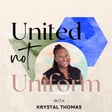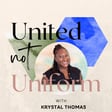Become a Creator today!Start creating today - Share your story with the world!
Start for free
00:00:00
00:00:01

Where Do We Go From Here? Navigating the Tension of Those Who Grieve and Those Who Rejoice
In this series of Kickin It with Krystal, I talk candidly with you about life after the election. What does it look like to grieve with those who grieve and rejoice with those who are rejoicing? Is it even possible? While I don't have all the answers, my hope is that this episode is a safe space for however you are feeling during this time.
To learn about upcoming projects and more, be sure to check out unitednotuniform.com!
Transcript
Celebrating Anniversary and Mission
Mixed Emotions Post-Election: Compassion and Unity
00:00:49
Speaker
Hi everyone! So excited to be with you all today. So um I was actually planning to release a different episode today ah but in response to the election there's just a lot of um feelings There's a lot of processing that has been taking place over this last week and really wanting to make sure we had a space and a real conversation um to allow time and space for all of that. so
00:01:23
Speaker
um First, I did want to start off with more of a celebratory um celebration. So for those of you guys who have listened to you United Not Uniform from the beginning, the first episode um this Sunday marks a year that United Not Uniform podcast was in existence. ah Now I know for me, I am still in disbelief in a lot of ways in um having a vision for this ministry of having a space where we are talking about faith,
Addressing Marginalized Fears: Spiritual Reassurance
00:01:57
Speaker
we're talking about culture, we're talking about what's happening outside of the church's walls and and to be a bridge, creating spaces for creatives. There's just so much that has
00:02:07
Speaker
um just continue to to to bloom and blossom uh within this ministry and i'm just i just wanted to take time and space just to thank you all um those of you who have listened who have been so supportive who have been so encouraging um and for those of you who have wrestled or maybe disagreed uh it's just such a gift to and um reflect back on where I've started and where I am now. And I'm just very thankful. So I wanted to celebrate with you all. We're a year old. I might have to figure out something else for us to celebrate, but um thank you all for being on this journey with me.
00:02:55
Speaker
So as we get into, we're now a couple of days after the results of the election. And you know for me and my role at the local church that I serve in, um it's been a lot of navigating the um people who are are suffering, who are feeling unseen, who are fearful, um who are hurting.
00:03:22
Speaker
and also those who are more joyful and are like happy with the results of the election. And the tension now is what does it look like for us to leave space for each other? What does it look like to not allow all this to divide us, but also having space to for those who grieve to grieve?
00:03:46
Speaker
And for those who celebrate to celebrate, but to do so in love and seeing the pain and the fear and the other. Um, and that's a hard place to be. I mean, honestly, in the, in the time and the space that we are in,
Parable of the Good Samaritan: Compassion in Action
00:04:00
Speaker
it's all about gloating. It's all about, see, I told you and I was right. And, and, um, the,
00:04:09
Speaker
Yeah, it's now a time for compassion. And so um I want to first start with those who are mourning and who are suffering um and who are fearful. Again, like I said, in my role and just in personal ministry call, um I've always been called for those on the margins, for those who are hurting.
00:04:32
Speaker
um
00:04:35
Speaker
And just to acknowledge that I'm sitting there with you. um There's a lot of fear, especially from those who have immigrated to this country and the impacts and and language that has been used. There's hurt, you know, even from women of color and feeling unseen and and feeling like They don't belong and just fearful of what the future holds um And I know there's so many other groups who I'm not naming who I um who are also fearful and and afraid and I think
00:05:14
Speaker
What's important for those of you who are believers is to be reminded of who is sovereign, um that God is the one that sits on the throne and that he's in control, but also extremely, and even more importantly, in the midst of the suffering, in the midst of the grief, is that he is also the God that is very near and dear. He is the God who sees as he is Elroy.
00:05:40
Speaker
And um so every tear that you have shed, he's right there with you. For those of you who feel that there's not a place or that you don't belong, and I'm here to tell you that um that's not true. That even though everything feels or seems dark, that ah to be encouraged and reminded where you are placing your hope.
00:06:09
Speaker
um
00:06:12
Speaker
something that has comforted me during this time is as I reflect in the past I let so many people I talked to it was like oh we're going like like thinking about like past elections and and things like that because again there's always a side that's celebrating and there's also a side that is hurting and um with every
Biblical Justice and Mercy
00:06:30
Speaker
single election and I think something that encourages me is that um I think now is a time for um one, us as a collective community to really be a light ah to those who are discouraged and are are saddened and are hurting.
00:06:51
Speaker
to be a space for healing and ah just a space of community. I think the same for those who are celebrating. It's an opportunity to celebrate um in your own way while also being reminded that you are part of a diverse and unified community of people with different life experiences and situations who may be impacted differently or may not Yeah, two may just be impacted differently. And so what does it look like to love and to love others well?
00:07:23
Speaker
I was really wrestling over this episode because it was one that I knew I needed to do just with um the results of the election being only a week out. And as someone who has just been, like I said earlier, been called to minister and to to care for people and to just love on people.
00:07:49
Speaker
um especially those who, like I said, who are hurting or wrestling. Um, I just, it wouldn't have felt right to just continue as if things were normal when, um, for a lot of people it's not right. There are changes. Um, yeah.
00:08:13
Speaker
Yeah, so yeah, as I've been, like I said, praying and meditating over what would be the right words to say, what could I say to both encourage um all of us in continuing to seek to be a community that is
Cultural Context and Genuine Compassion
00:08:32
Speaker
united, and what I mean united, I mean united by the spirit, united in the desire to love each other well, to better understand each other well. um But that also means that we are not uniform. it doesn't It means that we may have different opinions and perspectives. Now, it's hard when there is real suffering. It's hard where there are real implications for
00:08:59
Speaker
um
00:09:02
Speaker
you know people's lives, their livelihoods, like the amount of people I've talked to who may not have a job in a couple of months, or who are fearful that they won't be able to stay in the country in a couple of months, or you know there's a lot of real um hurt and pain and all of that in between.
00:09:21
Speaker
And so what I don't wanna do and what I know i I'm not capable of doing is to come here um as if I have all the answers. Rather, I think it is in the wrestling and in the honesty um that you're having a conversation with a friend, um a friend who you may disagree with, a friend who you may ah be encouraged by um But I think it's important for us to just be real. And so as I was um thinking over this episode, the there was a story. So for those of you who don't know, I am currently in seminary.
00:10:03
Speaker
And this semester I'm taking a really amazing um class that's focused on um ah biblical justice throughout the Old and the New Testament and kind of starting with the story of creation and the fall of humanity and going all the way through with Scripture and and you know the overarching story of redemption and how God is seeking to reestablish Shalom.
00:10:30
Speaker
um for all people and so like how this concept of justice and biblical justice is tied very closely to um shalom ah because it is desiring and seeking the welfare of your neighbor um and yeah as I was like praying over this episode and wrestling, I was like, that is what, I think that's the message um that people need to hear. um And so we had an assignment. Again, so many of you guys are familiar with this story of the Samaritan.
00:11:11
Speaker
And if you're not, I'm going to read the passage of scripture just so that we're all operating on the same page. um I'll be reading from the New Living Translation. Again, read in whatever translation speaks to you. I myself enjoy reading a variety of different ones, but for today it's going to be the NLT. And it's going to be Luke chapter 10, verse 30 through 37.
00:11:38
Speaker
Jesus replied with a story. A Jewish man was traveling from Jerusalem down to Jericho, and he was attacked by bandits. They stripped him of his clothes, beat him up, and left him half dead beside the road. By chance a priest came along, but when he saw the man lying there, he crossed to the other side of the road and passed him by. A temple assistant walked over and looked at him lying there, but he also
Being a Neighbor: Love and Mercy
00:12:06
Speaker
passed by on the other side.
00:12:09
Speaker
Then a despised Samaritan came along and when he saw the man, he felt compassion for him. Going over to him, the Samaritan soothed his wounds with olive oil and wine and bandaged them. Then he put the man on his own donkey and took him to an inn where he took care of them.
00:12:29
Speaker
The next day he handed the innkeeper two silver coins, telling him, take care of this man. If this bill runs higher than this, I'll pay you the next time I'm here. Now, which of these three would you say was a neighbor to the man who was attacked by bandits? Jesus asked. The man replied, the one who showed him mercy. Then Jesus said, yes, now go and do the same.
00:12:55
Speaker
And so as you know I'm sitting here, and again, it's for class, we have a project where we're unpacking the scripture. And I think something that really stood out to me, again, this is a story that, or a passage of scripture that I've heard preached several times. I've heard a lot of people, you know we have so many things named after the Good Samaritan. um But I think what really resonated with me in reading this passage and analyzing it,
00:13:22
Speaker
um There were several things. so One, you know we I didn't read this in um the the passage, but again, there was a whole backstory of how God had called um his people to be a nation um that would minister and reach all other nations.
00:13:40
Speaker
And a lot of the the laws and the practices were, one, to have them to remember their experiences in Egypt and the suffering that they experienced so that they would show compassion and mercy, especially to those who were the most vulnerable, um such as um the widowed orphans and especially the stranger.
00:14:01
Speaker
And so what we see here is in scripture, there's been a shift. And again, there's a lot of context. Again, this is not enough time to do a complete expository sermon on um this. If you're interested, let me know. Because it's the passage that I really, um really am very passionate about.
00:14:18
Speaker
ah But there's a lot of context. And I think what really stood out to me is that oftentimes, you know yes, we rush to the Good Samaritan um and in the his actions, but I think it's also important to to get more understanding and context as to why the priest and the temple worker um we're not were not there, right? Were not in the way that we would think a neighbor should act or behave. And I think that that would also give us context regardless of where
00:14:50
Speaker
you are falling, whether you identify more with the man on the side of the road, half dead, feeling beaten, feeling discouraged, or the person that is walking by or seeing from afar. And so, you know, one of the questions or the prompts was, okay, before we get to the Good Samaritan,
00:15:12
Speaker
what What were some of the reasons that that that the priest or the temple, the person that worked at the temple, wouldn't intervene and help the person? And so there's um there were several things that came up to me when I was doing some study in the different commentaries.
00:15:29
Speaker
One was that, you know, the period in which, um again, Jesus is referring to in this parable, um it's after the exile and the period between the Testaments. So priests and leaders of the Jewish community are really trying their best to adhere to the law and seeking redemption for Israel. So there's that context that's available there, too, in why, you know, there's a lot of um pushback in why Jesus was being viewed as so rebellious or so radically different.
00:15:58
Speaker
um the The description of how the man after he was attacked was ah appeared dead or half dead. And there are so many political laws around how they are to and interact with the dead um and ah how this can make people ceremonially unclean. There's all of these other things. But that also, I mean, again,
00:16:20
Speaker
I'm not trying to like we're not trying to change the meaning of scripture but you know like we're giving context as to you know how the priest and the person working at the temple were adhering to the law in a lot of ways but as we can see still kind of missed what does it look like to actually love and care for our fellow image bearers, right? And I think that that is such a important factor that we just need to like sit in. um And we don't often talk about
00:16:54
Speaker
Right? um It's very quick to be like, oh, the priest and the people at the temple, they were wrong. And like, this is why we need to be like a Samaritan. But in a lot of ways, we can unintentionally be like the priest. We can unintentionally be like the person working at the temple. And this isn't easy, right? We are all human. who We are all broken. We are all um in need of a savior. And so, you know, the the key point is
Unity in Diversity: Love Beyond Politics
00:17:24
Speaker
the compassion right and so when when we learn about the Samaritan and again there's history and context as to why the Samaritan is is um seen as the unlikely hero in the story and what that would have signified for the Jewish community and again more than happy to get more into that if that's what you guys are are interested in but for the purposes ah of of today's podcast
00:17:48
Speaker
um to know that he was the Samaritan was moved by compassion. And so you know getting to Jesus's point of that, the focus is less on defining who the neighbor is and more about how we are treating others and being neighbors to others um and how often that is being neighbors to the ones who are often ignored or the ones that are suffering.
00:18:12
Speaker
and yeah and so you know it's it's the one who had mercy um now many of us you know all of us carry within our stories our own things that we had to overcome our own trials our own things that we faced And i my hope and my prayer is that similar to um God's call for his people to um be in remembrance not only of his faithfulness and like what God has done for them, but also where they were delivered from. I think that there is such an opportunity for that mercy and that compassion in how we see others, um especially those in the midst of suffering, in the midst of grief, in the midst of anger.
00:18:56
Speaker
um and also those who may be celebrating and rejoicing and not understanding why it is such a um a hurtful and and sad thing for others, right? This passage of scripture gives us the opportunity to really wrestle with what does it look like to love others well um and to love others well as we have been loved by God. Yeah.
00:19:29
Speaker
And I think we just need to sit in that. We need to sit in what does that look like to, again, in whatever feeling that you were bringing, whatever emotion, whichever ah frustration or hurt, all of that. Again, guys, like i when
Prayers for Ministry and Community
00:19:50
Speaker
when the Lord called me to start United Not Uniform,
00:19:55
Speaker
I knew that it it's a ministry that operates in the tension. It operates in the hard place of um finding more about what unifies us rather than what makes us um unable to be one body. um And part of that is, again, going back to scripture, weeping with those who weep and rejoicing with those who rejoice. um And so, yeah. so For those of you who are listening, I pray that this podcast encouraged you. I pray that you were able to find some solace in knowing that you're not alone in in the wrestling and in the hurt or in the celebration, wherever you are. um But my hope is that we don't just lose sight of where and who we put our hope in.
00:20:47
Speaker
The prayer that I've been praying over and over again is like, God, what are you going to do? um How um can this ministry be a light in a time that um the world is so divisive? And so I invite you all, please join me in praying over this ministry. Please join me in praying over each other um as we just create space just to like process what does life look like now?
00:21:14
Speaker
um How can we neighbor those well, especially those who are different or voted differently from us? um And no, please don't go around saying like, who did you vote for? That's not what I'm saying. But I do think the gut reaction is to isolate, is to hide, is to withdraw.
00:21:36
Speaker
um And I want to both challenge and encourage, or maybe invite is a better phrase for us to live differently. Take the time, take the space to lament, rejoice, whatever, wherever you are, but be reminded it is um your kingdom come, your will be done on earth as it is in heaven. It is God's will.
00:22:06
Speaker
And ultimately, we are called to love each other. We are called to be a collective body. um who is able to recognize the needs and the hurts and the pains of the different parts of the body. And sometimes we do this well and sometimes we don't do this well. But the goal is that we are always striving to be more and more like Jesus. So whether that's you who's already part of a church community and you are just wrestling with like, how am I going to be cared for?
00:22:36
Speaker
um
00:22:38
Speaker
Please lean in. I've had some of the most rewarding and beautiful um conversations with people who have allowed me to be a safe space for them, for them to confide and and to just share what's on their heart. For those who may be outside
Embracing Differences with Compassion
00:22:55
Speaker
of the church, who you're feeling the grief, you're feeling the anger, and you view the church as the problem, um my prayer for you would
00:23:12
Speaker
I said this in another podcast that we recorded before this is going to come out in the next next episode that as someone who um had left the church because of church hurt and was very angry at the church for a long time and spoke actively against the church
00:23:32
Speaker
that some of the most pivotal moments in that time where I was experiencing so much hurt and so much anger and frustration was in those real honest prayers that I prayed with God.
00:23:44
Speaker
um
00:23:48
Speaker
that I asked the questions that i I shared my anger, I shared my frustration, I shared all of that. And it took some time before I was willing or ready to even speak to someone else in in the church or connected or whatever, um but to know that God still met me in my anger, in my hurt, in my frustration.
00:24:12
Speaker
And for those of you who who are rejoicing and are happy with the results of the election, like my prayer for you is to lead into that heart of mercy in recognizing that while you are celebrating, that there are others who are weeping. And what does it look like for you to come alongside them as well?
Invitation for Further Conversation
00:24:36
Speaker
um yeah and I believe in us, I believe that we can be different, um that we can lean in and learn how to love each other well even in our differences and to care for those on the margins, to care for those whose stories that are very are similar and are very different um but that by allowing other stories to um and hearing other stories doesn't dilute or water down our own but rather allows us to in my own in my opinion allows us to live more um honestly and boldly
00:25:18
Speaker
um from a posture of love and a desire for compassion. So as I end this episode, let us all be moved by compassion and whatever that looks like for you.
00:25:38
Speaker
Please know that you're not alone. If you have any questions, if you want to chat, please reach out to me at united nut.uniform at gmail dot.com. I'd love to hear from you. Like I said, I'm not going to have all the answers. I'm never going to claim to be, but that this is a space that we are learning. What does it look like to truly live united and not uniform? So remember, there is more than enough space. I gotta say it again.
00:26:09
Speaker
There is more than enough space for you to be seen and to see others. I'll talk to you all next time.








